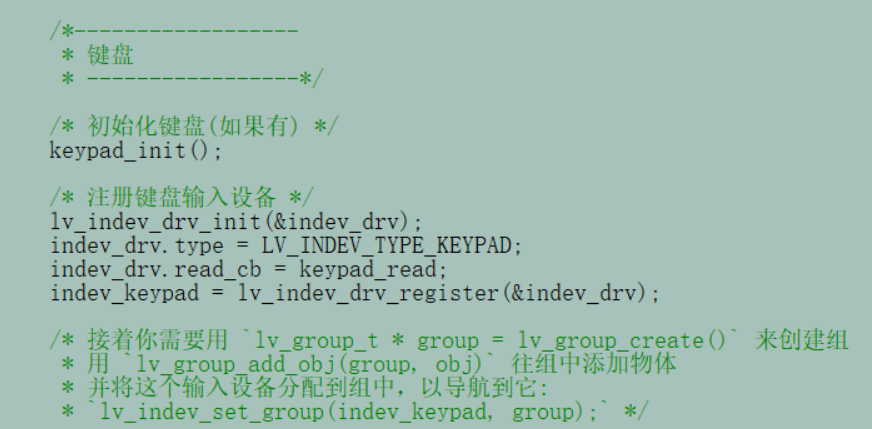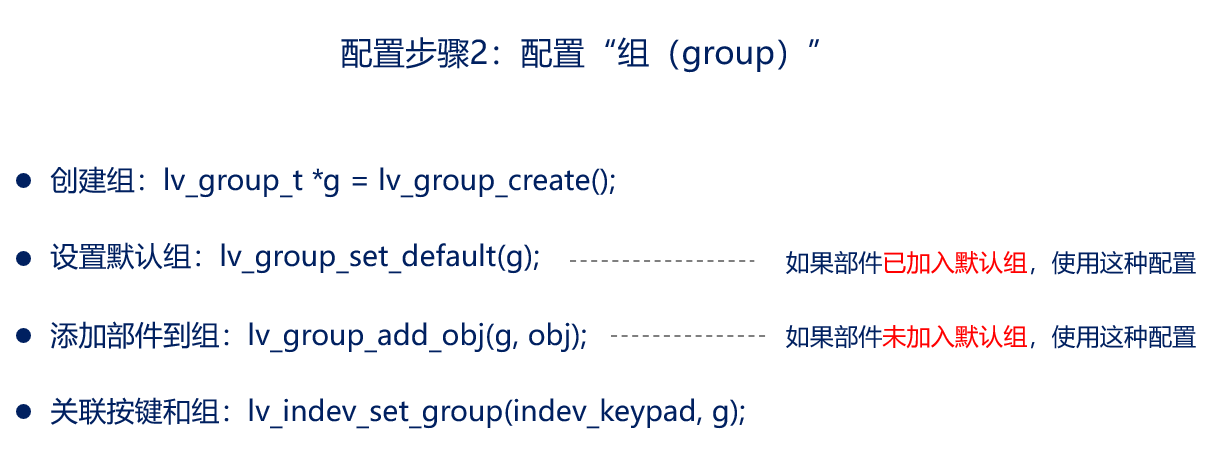Appearance
实体按键
使用一个实体按键的时候, 需要把所控制的组件添加到组里面, 把他和按键的组关联起来

有的部件默认已经在这一个组里面了, 不需要再次添加
配置输入设备
在这里配置时候实际使用的是键盘的相关代码
c
/* 键盘 */
static void keypad_init(void);
static void keypad_read(lv_indev_drv_t * indev_drv, lv_indev_data_t * data);
static uint32_t keypad_get_key(void);
c
/*------------------
* 键盘
* -----------------*/
/**
* @brief 初始化键盘
* @param 无
* @retval 无
*/
static void keypad_init(void)
{
/*Your code comes here*/
key_init();
}
/**
* @brief 图形库的键盘读取回调函数
* @param indev_drv : 键盘设备
* @arg data : 输入设备数据结构体
* @retval 无
*/
static void keypad_read(lv_indev_drv_t * indev_drv, lv_indev_data_t * data)
{
static uint32_t last_key = 0;
// /* 这段代码是 LVGL 给出的例子,这里获取坐标好像是多余的 */
// /*Get the current x and y coordinates*/
// mouse_get_xy(&data->point.x, &data->point.y);
/* 获取按键是否被按下,并保存键值 */
uint32_t act_key = keypad_get_key();
if(act_key != 0) {
data->state = LV_INDEV_STATE_PR;
/* 将键值转换成 LVGL 的控制字符 */
switch(act_key) {
case KEY0_PRES:
act_key = LV_KEY_NEXT;
break;
case KEY1_PRES:
act_key = LV_KEY_PREV;
break;
case WKUP_PRES:
act_key = LV_KEY_ENTER;
break;
}
last_key = act_key;
} else {
data->state = LV_INDEV_STATE_REL;
}
data->key = last_key;
}
/**
* @brief 获取当前正在按下的按键
* @param 无
* @retval 0 : 按键没有被按下
*/
static uint32_t keypad_get_key(void)
{
/*Your code comes here*/
return key_scan(0);
}- 支持的按键
c
enum {
LV_KEY_UP = 17, /*0x11*/
LV_KEY_DOWN = 18, /*0x12*/
LV_KEY_RIGHT = 19, /*0x13*/
LV_KEY_LEFT = 20, /*0x14*/
LV_KEY_ESC = 27, /*0x1B*/
LV_KEY_DEL = 127, /*0x7F*/
LV_KEY_BACKSPACE = 8, /*0x08*/
LV_KEY_ENTER = 10, /*0x0A, '\n'*/
LV_KEY_NEXT = 9, /*0x09, '\t'*/
LV_KEY_PREV = 11, /*0x0B, '*/
LV_KEY_HOME = 2, /*0x02, STX*/
LV_KEY_END = 3, /*0x03, ETX*/
};在文档的Key这一个部分有某一个部件可以接受的按键
c
/*------------------
* Keypad
* -----------------*/
/*Initialize your keypad*/
static void keypad_init(void)
{
/*Your code comes here*/
}
/*Will be called by the library to read the mouse*/
static void keypad_read(lv_indev_drv_t * indev_drv, lv_indev_data_t * data)
{
static uint32_t last_key = 0;
/*Get the current x and y coordinates*/
mouse_get_xy(&data->point.x, &data->point.y);
/*Get whether the a key is pressed and save the pressed key*/
uint32_t act_key = keypad_get_key();
if(act_key != 0) {
data->state = LV_INDEV_STATE_PR;
/*Translate the keys to LVGL control characters according to your key definitions*/
switch(act_key) {
case 1:
act_key = LV_KEY_NEXT;
break;
case 2:
act_key = LV_KEY_PREV;
break;
case 3:
act_key = LV_KEY_LEFT;
break;
case 4:
act_key = LV_KEY_RIGHT;
break;
case 5:
act_key = LV_KEY_ENTER;
break;
}
last_key = act_key;
} else {
data->state = LV_INDEV_STATE_REL;
}
data->key = last_key;
}
/*Get the currently being pressed key. 0 if no key is pressed*/
static uint32_t keypad_get_key(void)
{
/*Your code comes here*/
return 0;
}设置组

Objects you want to control with a keypad or encoder need to be added to a Group. In every group there is exactly one focused object which receives the pressed keys or the encoder actions.
You need to associate an input device with a group. An input device can send key events to only one group but a group can receive data from more than one input device.
To create a group use lv_group_t * g = lv_group_create() and to add an object to the group use lv_group_add_obj(g, obj). 创建
To associate a group with an input device use lv_indev_set_group(indev, g), where indev is the return value of lv_indev_drv_register() 设置关联设备
Interactive widgets - such as buttons, checkboxes, sliders, etc. - can be automatically added to a default group. Just create a group with lv_group_t * g = lv_group_create(); and set the default group with lv_group_set_default(g); 可以使用默认的设置